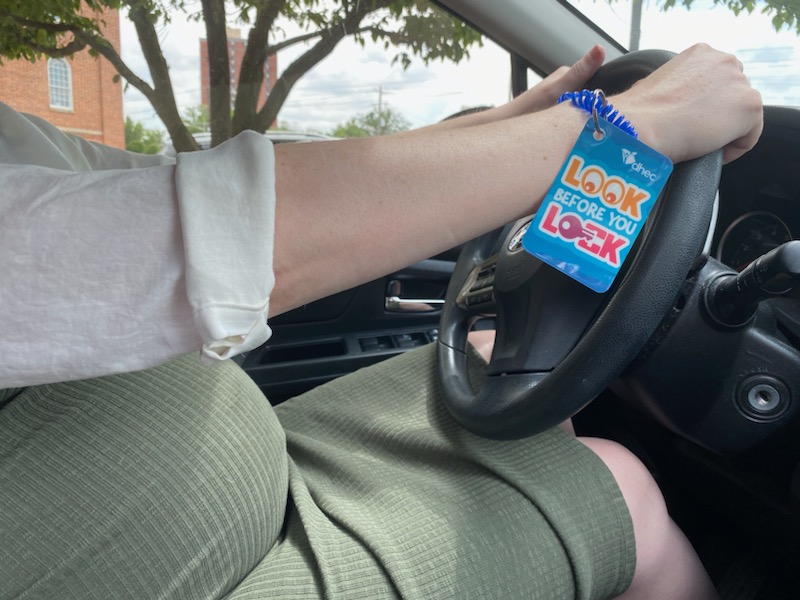To ensure you’re receiving the most up-to-date and accurate information, please choose the correct agency from the homepage. The DHEC website is no longer being updated and will be permanently unavailable Dec. 31, 2024.
DHEC Offers Tags, Fliers for Parents and Caregivers to Help Prevent Hot Car Deaths of Children
FOR IMMEDIATE RELEASE:
June 26, 2023
COLUMBIA, S.C. – As another South Carolina summer begins, the South Carolina Department of Health and Environmental Control (DHEC) reminds parents and caregivers of lifesaving steps they can build into their daily routines to help prevent pediatric vehicular heatstroke, commonly referred to as “hot car deaths.”
Heatstroke can occur throughout the year as temperatures inside a vehicle can reach life threatening levels even on mild or cloudy days. Children are particularly vulnerable to hot car deaths as their bodies’ ability to maintain internal body temperatures is not as efficient as adults, and their body temperature increases at a rate of 3 or 5 times faster than adults.
"A common misconception is parents don’t realize how quickly the temperature will rise in a parked vehicle,” said Kevin Poore, program coordinator with DHEC’s Division of Injury and Substance Abuse Prevention and Director of Safe Kids South Carolina. “A car can heat up nearly 20 degrees in 10 minutes, and cracking a window doesn’t help.”
South Carolina has had 22 hot car deaths since 1998. In 2022, there were 33 deaths across the nation affecting children from Idaho to New Jersey and throughout the south from California to Florida. These deaths are 100% preventable, and according to the National Safety Council, each death was linked to one of three primary circumstances: parents or caregivers forget a child in a vehicle, a child gains access to the unlocked vehicle or someone knowingly had a child harnessed or locked in the vehicle.
“No child – or pet for that matter – should ever die or be harmed from being in a hot car," said Dr. Edward Simmer, DHEC Director. "By taking some simple steps, parents and caregivers can ensure this never happens.”
DHEC is supporting a Prevent Vehicular Heatstroke educational campaign by distributing “Look Before You Lock” materials to Safe Kids Coalitions around the state, while supplies last. This includes wrist tags designed to remind a drive to check for a child in the backseat before exiting the car.
To help parents and caregivers remember to never leave a child in a car, DHEC is supporting a Prevent Vehicular Heatstroke educational campaign and is distributing “Look Before You Lock” materials to Safe Kids Coalitions around the state, while supplies last.
The tags are designed to be worn on the wrist while driving and only after the child is safely removed from the car does the bracelet get attached back to the harness. The intention is that if a caregiver walks away from the vehicle with this tag still on their wrist, the tag’s presence will alert the caregiver to the fact that their child is still in the vehicle.
The Look Before You Lock educational materials are available for anyone to download and print at schdec.gov/hotcars. Look Before You Look keychains are available for free, while supplies last, by emailing injury@dhec.sc.gov.
“Heatstroke can happen anytime, anywhere. We don’t want to see this happen to any family,” Poore said. “That’s why DHEC is asking everyone to help protect kids from this very preventable tragedy by never leaving a child alone in a car, not even for a minute.”
Another tip for parents and caregivers to prevent hot car deaths is to remember to ACT:
- A: Avoid heatstroke-related injury and death by never leaving a child alone in a car. Make sure to keep your car locked when you’re not inside of it, so kids don’t get into it on their own.
- C: Create reminders. Keep a stuffed animal or other memento in your child’s car seat when it’s empty and move it to the front seat as a visual reminder when your child is in the back seat. Or place and secure your phone, briefcase, or purse in the back seat when traveling with your child.
- T: Take action. If you see a child alone in a car, call 911. Emergency personnel want you to call. They are trained to respond to these situations. One call could save a life.
For more information on preventing child heatstroke deaths, visit schdec.gov/hotcars or safekids.org/heatstroke.
While DHEC’s Look Before You Lock campaign focuses on protecting children, the agency reminds pet owners of the dangers of leaving pets in cars as well. The Humane Society of the United States provides a list of steps someone can take if they see a pet left inside a parked vehicle, which can lead to the animal’s heat-related death.
###
